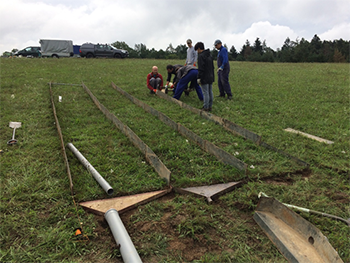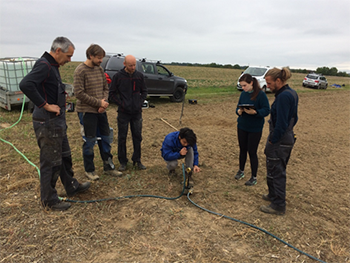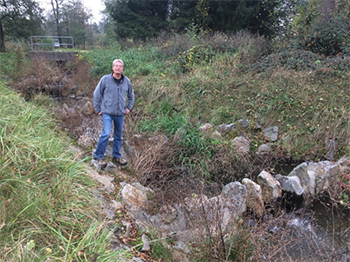


Many of my colleagues know that I was on professional development leave (sabbatical) during the fall 2019 semester. I was hosted by the Czech Technical University (CTU) in Prague by Dr. Tomas Dostal in the Faculty (College) of Civil Engineering, Department of Landscape Water Conservation. While there I worked on three research projects and taught my stream restoration (revitalization) class. The research projects included:
- a field experiment on fine sediment trapping in grassy swales (Photo 1),
- a soil erosion study advancing models by coupling cropland field experiments from a rainfall simulator and a jet test device (Photo 2). I brought the jet test device from my research laboratory at the University of Tennessee to evaluate its use in this new application, and
- a comparative study on stream restoration practices in the US versus stream revitalization practices in the Czech Republic (Photo 3).
My CTU colleagues and I applied for a research and teaching grant through their Ministry of Education Czech-American Cooperative Program (CACP) to study stream sediment transport and resuspension processes. After a couple of tries, this fall we were informed of the proposal success, and CTU will be awarded a three-year grant totaling approximately $1M (equivalent) funding. This Czech Republic Program is similar to the National Science Foundation’s (NSF) Partnership for International Research and Education (PIRE) Program. The goal is to submit a PIRE proposal to the NSF this fall mirroring the CACP. The CACP grant will provide for my CTU colleagues to come to Tennessee to work on collaborative research projects. My sabbatical was a rewarding experience, and from a University of Tennessee perspective, my time there expanded our international exposure.
Now that I am back at the University of Tennessee and the Tennessee Water Resources Research Center (TNWWRC), I have several plans to build the water resources research capacity in the state. The TNWRRC is partially funded by a 104(b) grant from the US Geological Survey (USGS) relying on an annual federal funding allocation under the Water Resources Act §104). Each year we solicit pre-proposal from researchers across the state, and the successfully funded research projects are listed in this issue of the newsletter. Under the Act, there is also a national research project, the 104g Program, in which researchers are encouraged to submit proposals due in March 2020. (The solicitation posted on the TNWRRC web page.) One of my goals for this coming year is to increase the number of 104g proposals submitted to the USGS from all academic institutions in the State of Tennessee, and provide guidance in proposal preparation. In addition, I will be meeting with the new Director of the USGS Nashville Office this month to also discuss increasing the number of 104g proposals, and to develop a graduate student internship program.
Other goals for this year include continued support of activities with the UT Watershed Faculty Consortium, which will sponsor their Watershed Symposium during the Fall 2020 semester. The theme selected by the group is “Adapting to Climate Change.” Another goal is research team-building, where the TNWRRC can provide support, and to reach out to the other state water centers to build stronger collaborative ties for larger initiatives. Initiatives include a follow-up on the State’s H2O Report. I will be meeting with the TDEC Commissioner at the end of the month at the West Tennessee Water Resources Symposium, where he will be giving an update and vision for the future. It appears at this time, education and outreach will be a major focus for implementing ideas that come out of the 2018 H2O report.
Other initiatives include development of a State Urban Waters Report Card for the use of municipal stormwater (MS4) communities. The hope is that the MS4 communities will provide funding to support a part-time staff person at the TNWRRC. The development of the Report Card is in its very early stages so if you have any interest in being part of it, please contact me. I will be attending the annual water director’s meeting of the National Institute for Water Resources (NIWR) between February 10-12, 2020. I will provide an update on national initiatives and research funding opportunities among the different federal agencies.
Sherry Redus, Tim Gangaware, and I have been working for the past year on improving the web page for the TNWRRC. A new version is on-line (http://tnwrrc.tennessee.edu/). Along getting news updates and other relevant information, we want this web site to be the forum for job announcements. Please send me any job announcements or news items and we will post them on our web page.